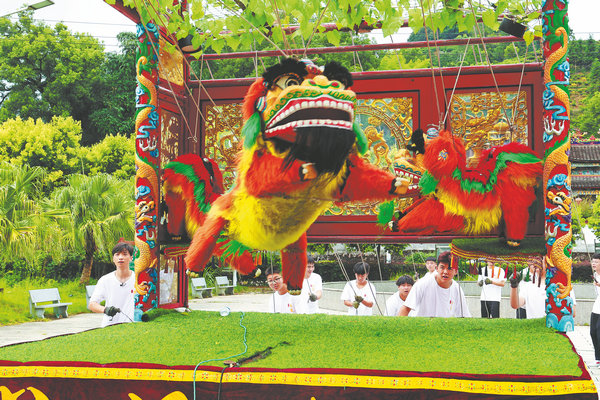High hopes for lion dance of the air
Young performers slowly master intricate skills required to keep the 'creature' entertaining for the audience, Yang Feiyue and Hu Meidong report.
By Yang Feiyue and Hu Meidong | China Daily | Updated: 2024-04-01 07:50

Give fishermen a thread, and they can tie it to a hook to catch fish, but give it to someone from Huotong town and they can make a lion fly. Indeed, many children growing up in the town in Ningde city, Fujian province, might be under the early impression that lions can actually fly, as they are exposed to the popular local folk art of the string lion dance at a tender age.
From a distance, numerous bamboo lions with colorful manes were visible high above a small wooden stage in Xingxian village in mid-March, each seeming to have a life of their own. Closer up, it was possible to see that they were linked by what looked like countless long strings that were being manipulated by a team of youngsters behind the stage.
The youngsters exerted themselves during the show, sometimes using their weight to haul on the strings, and other times jumping up and down to manipulate the threads, which resembled a neural network, to make the lions pull off stunts, ranging from crouching and waking up, to leaping, chasing left and right, and fighting for a ball.
Applause broke out from the crowd as the lions came to rest, and a group of young boys stepped out from behind the curtain.
"This is my happiest moment, getting recognition from the audience," says Chen Jihong, 24, who leads the team of around 30 members aged between 13 and 24.
Like other children in the region, Chen was first fascinated by the dance as a child when his mother took him to watch a lantern show on eryue'er, the second day of the second lunar month, which is also known as longtaitou, or Dragon Head Raising Day. He recalls how the crowd suddenly became excited and roared for the string lions to come out. Curious, he eagerly pushed through the crowd to get a closer view as the lifelike beasts came into sight.
Huang Zhenqiao, a senior inheritor of the tradition that was named a national intangible cultural heritage in 2006, says that the string lion dance dates back about 1,300 years and is one of the most charming shows at the local lantern fair on that day.
























